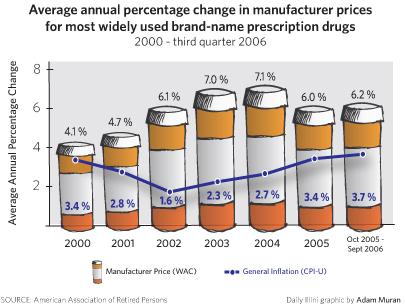Importing drugs may cost less

Joseph Lamberson
January 25, 2007
As the costs of prescription drugs continue to rise, low-income individuals face increasing difficulty buying the medicine they need, said David Gross, interim director of the American Association of Retired Persons (AARP) Public Policy Institute.
Now some, including Gov. Rod Blagojevich, are looking overseas to solve the problem of expensive pharmaceuticals, a plan that one University law student says carries safety risks.
Amy Rosenband, spokesperson for the Illinois Department of Healthcare and Family Services, said that Blagojevich has taken numerous steps to address the issue. He signed into law the Illinois Cares Rx program, which provides monetary assistance to low-income seniors.
Blagojevich also developed the I-SaveRx program, which helps participants buy imported pharmaceuticals from Europe and Canada. The program operates in Illinois, Wisconsin, Missouri, Kansas and Vermont.
Vaishali V. Shah, a graduate law student, wrote in the University of Illinois Law Review that currently, importation of prescription drugs is illegal in the United States. This federal law is the result of an FDA mandate which attempts to insure the safety and effectiveness of drugs American citizens are consuming.
Get The Daily Illini in your inbox!
But the FDA has not shut down I-SaveRx.
Shah wrote in her article that importing drugs from foreign countries entails certain safety risks, including counterfeit drugs, improper labeling and shipping and ineffective drugs.
These risks are serious as even “minimal changes to prescription drug ingredients can mean the difference between life and death.”
However, Rosenband said that the I-SaveRx program has never had any documented safety issues.
“The program has filled nearly 38,000 prescriptions saving people in the program a total of $4.6 million with no issues of safety with any of those prescriptions,” Rosenband said.
The I-SaveRx program implements numerous safety checks. Foreign pharmacies that participate in the program are checked by the same inspectors who evaluate Illinois pharmacies.
Gross said it is very possible to ship drugs over borders without safety risks.
“European countries, they’ve been trading pharmaceuticals across the borders for 30 years. There’s no evidence of any safety issues involved in that,” Gross said. “It seems like we should be able to do that safely as well.”
In any case, the price of prescription drugs continues to rise at a rate as high as seven percent per year according to a recent AARP report.
Shah wrote that although it is illegal, “those who import drugs in violation of the law have nothing to lose. Rather, importers that provide cheaper drugs are considered heroes to the recipients of the drugs.”
Shah continued that this problem could be solved without importing drugs from overseas. The FDA provides a 20-year patent for new brand name drugs, during which time no generic versions of the drug may be introduced to the market.
Revocation of this law would help encourage market competition and pressure brand name drugs to lower their prices.
Gross said that some senior citizens become desperate while trying to manage their prescription drug bills.
“Some people will try to skip doses and not refill their prescriptions,” Gross said. “Obviously some people are making choices about what to eat and what else to pay for too.”
Gross added that there are generic forms of brand name drugs, some as much as one-tenth the cost of the brand name, and it is important for patients to inquire about these alternatives.
“People need to talk to their doctors and pharmacists about ‘here are the drugs I’m taking, are there things that are cheaper that do the same thing?'” Gross said.






